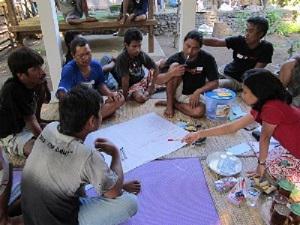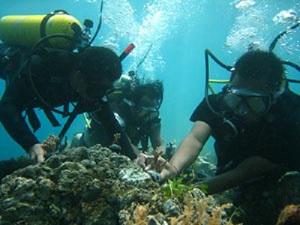Gayatri Reksodihardjo Lilley
The Tejakula reefs sustain a high diversity of reef organisms, which support the livelihoods of coastal people with fisheries or tourism. Threats to the reefs include poor waste management, destructive fishing techniques, and increases in sea temperature, which bleach the corals. A lack of awareness by local stakeholders of the need to conserve coral reefs, has led to a decline in reef health, and a loss of reef species. The project aims to assist coastal communities, local government, youth, school teachers and children in understanding the importance and value of their reefs, and how they can protect them themselves.

Participatory rural appraisal in Les village.
Bali lies in the Coral Triangle, and has a great variety of marine habitats, with extensive coral reefs and an abundance of marine fish. It is one of the major centres in Indonesia for marine dive tourism, and one of the most important collection areas for marine ornamental fisheries. The project site covers 25.75 km of coastline, and supports the livelihoods of over 59,000 people. The coral reefs in North Bali face mounting pressures from marine tourism, land- and sea-based pollution. However, significant areas are also in an active stage of recovery from previous damage, including destructive fishing and coral bleaching.

Penuktukan communities planting corals.
The project will:
1. Conduct community participatory mapping of resource use in Penuktukan village as a pilot site. This activity is needed to assist the community in gathering traditional knowledge, inventory existing uses of their coral reef resources, and identify potential threats to be mitigated.
2. Conduct training workshops for local teachers to develop teaching materials for use with various student age groups. This activity aims to increase the knowledge and understanding of local teachers about the environment they live in and the marine resources they depend on, so that they can teach their pupils more effectively. This information is currently lacking from the existing school curriculum.
3. Assist local teachers in developing and implementing their own marine conservation program. This activity is needed to help teachers conduct education programs with an emphasis on marine environment topics that directly impact the lives of the local community. This is vital for the future sustainability of the marine resources on which the people depend.
4. Conduct training on nature interpretation, safe diving, organizational skills and development of micro enterprises for community groups. This activity is needed to equip community groups with the skills needed to operate their community-based ecotourism activities.
5. Conduct initial and follow-up perception surveys among the various local stakeholder groups on the importance of conserving coral reefs and resources, using questionnaires. This activity is needed for monitoring and evaluation of the impacts of the outreach and training program, and the effectiveness of the overall project. This information is crucial in needs analysis, and also extremely useful for subsequent modification and refining of materials and methods, because it determines the degree of involvement and commitment of the target community to any activities to be conducted there.